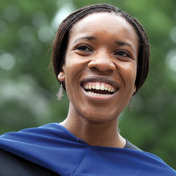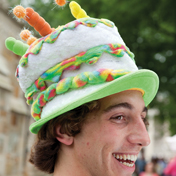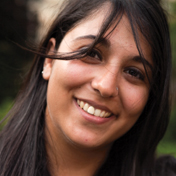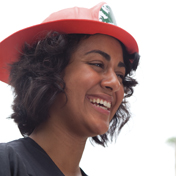|
Comment on this article
Commencement 2010
New grads on their time at Yale—and what’s next.
July/August 2010
Interviews by Cathy Shufro
Photographs ©Mark Ostow
As
part of my program, I did extended fieldwork, and I had a chance to spend, if I
put it all together, about two years in a country that I didn’t know really
very much, Cameroon. So I had a chance to be immersed in a different
sociocultural context and use a range of research methods to get at the
question that I’d been asking for several years [about domestic violence in
Cameroon]. And so, just to be at the end of my program is really enriching, and
in some ways I am coming to grips with the fact that I’m actually done—and
ready to face the world, as they say.
What
are your plans?
I’m
still looking for a job.
You
have a large group with you. Did you get a sense that people in Kenya are more
connected with their extended family than we are here?
I
was born in Kenya but I didn’t grow up there. I grew up in other, different
places. But in most parts of Africa, we think about the family very
differently. We do have a nuclear family, but for us family goes far beyond
that. So my boyfriend is here, but his mother is also here, and a friend of his,
and my parents, my brother, and a few friends.
Brenda Kombo
Nairobi, Kenya
PhD, Anthropology

Were
your parents worried about your going into theater?
I
actually have a job. I’m working at an education nonprofit next year. Hopefully
I’ll be able to do theater without being poor.
What
does the nonprofit do?
Math
education for middle schools. The company’s called Reasoning Mind.
How
did you find time to study? It seems that those theater projects are very
time-consuming.
They’re
good motivators. They keep you energized. Your adrenaline is up when you’re
doing theater.
So
you get your work done faster?
You
sleep less and do more.
Isaac Durand
Los Angeles, California
Trumbull College, Theater Studies

Has
anything surprised you about Yale?
Even
though I was from so far away, and I hadn’t spent much time in the United
States before, I had no issues settling in. Everyone was very friendly, very
welcoming, very interested in my life, where I was from. It was a very open and
welcoming community.
Do
you know what you’ll be doing next?
I’m
going to be doing an internship during the summer in New York City—it’s at a
tech start-up company—and looking for full-time stuff while doing that. I am
very interested in global health and international development work, so
hopefully I’ll transition into that somehow.
Things
have been unstable in Pakistan while you’ve been in New Haven. Was that hard
for you?
It’s
always hard to be away from home. It hasn’t at all changed my perception of
home; I plan on being there long-term. My whole family lives there. I’m the
only one here. It has been hard to be far away and detached in a way. I
probably would have preferred to be home with my family during all that.
Zehra
Ijaz
Karachi, Pakistan
Trumbull
College, English

What
made you want to go to law school?
I’ve
wanted to go to law school since I was in third grade. So, momentum. And an
acceptance letter from Yale.
When
you’re in third grade, what gets you interested in law?
That’s
a good question. I don’t know. It was a good decision, because I really liked
it. A lot of people here didn’t quite like law school. But it was really
enjoyable for me.
What
did you enjoy?
I
liked the theory. I liked the arguments. I just liked the questions they ask
and the answers they make us grapple with. Some people get excited about
numbers, and some people get excited about diseases. I, for some odd reason,
got excited about policy—and that’s really all that law is.
What
will you do after graduating?
I’m
going to clerk in Seattle, on the Ninth Circuit. … Which side does the
tassel go on?
David
Perez
Seattle, Washington
JD,
Law School

Why
are you wearing a fire hat?
My
father’s a firefighter.
How did you get interested in biomedical engineering?
I
bounced around a little in the sciences. I went from biomedical engineering to
biology to chemistry to chemical engineering and back to biomedical
engineering. I liked the problem solving, the mathematical aspect of biomedical
engineering. I was able to get to know everybody really well on a personal
level. We’ve studied together, we’ve gone to Rudy’s [Bar and Grill] together.
How
many people were in your year?
It’s
somewhere around 20. We are a very diverse group. We have athletes. I’m a
singer. We have people who were very interested in research, we had people that
really aren’t interested in research.
What’s
next?
I’ll
be attending medical school at the University of Pennsylvania.
Alyssa
Reyes
Stratford, Connecticut
Jonathan
Edwards, Biomedical Engineering

Why
do you take part in commencement ceremonies?
It’s
really a celebration for the students. That’s what it’s all about. Their
parents and families, and all the people that have supported them, they come as
part of the celebration. I think that’s very important.
And
I think the pomp and circumstance that surround such traditions are really
important to keep. I think mankind needs that time when one can be a little
smaller than one thinks one is. You can feel all of the vibes from the
graduates who are really there and their parents, and so it’s also about that,
too. But the pomp and circumstance is a tradition that we need to hold onto. It
touches our humanity. It makes us feel something that is a little bigger than
us, and it’s also a shared experience with colleagues and friends and people
who are really important to thank. It’s important that we pay homage to all of
those people. And it’s really quite something, just visually.
Robert
Reed
New Haven, Connecticut
Professor,
School of Art

|







